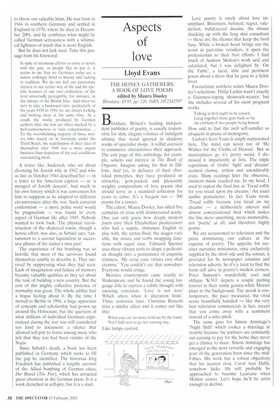Aspects of love
Lloyd Evans
THE HONEY GATHERERS: A BOOK OF LOVE POEMS edited by Maura Dooley Bloodaxe, 19.95, pp. 320, ISBN 1852243597 loodaxe, Britain's leading independent publisher of poetry, is usually responsible for slim, elegant volumes of indulgent whimsy that stand ignored in shadowy nooks of specialist shops. A wilful aversion to commerce characterises their approach. The end page of this anthology, for example, solicits our interest in The Book of Orgasms. Imagine asking for that in DilIons. And yet, in defiance of their cherished principles, they have produced an attractive, gem-packed and pleasantly weighty compendium of love poems that should serve as a standard collection for years to come. It's a bargain too — 300 poems for a tenner.
The editor, Maura Dooley, has sifted five centuries of verse with disinterested acuity. One can only guess how deeply modern poets envy their Elizabethan predecessors who had a supple. immature English to play with, the syntax fluid, the usages variable, the nouns and verbs swapping functions with equal ease. Edmund Spenser uses these vibrant tools to shape a pedestrian thought into a pentameter of exquisite trimness. 'My verse your virtues rare shall eternise.' You couldn't say that nowadays. Everyone would cringe.
Bravura counterpoint came readily to Shakespeare and he found the young language able to express a subtle thought with amazing concision. 'Love is not love/ Which alters when it alteration finds.' Three centuries later, Christina Rossetti tries a similar effect and it comes out like this:
When you can no more hold me by the hand. Nor I half turn to go nor turning stay.
Like lumpy custard. Love poetry is rarely about love triumphant. Bitterness, betrayal, regret, valediction, bulldozerecl dreams, the missus shacking up with the feng shui consultant — these are the themes that keep the bard busy. While a broken heart brings out the worst in part-time versifiers, it spurs the professionals to their best efforts. I find much of Andrew Motion's work arid and calculated, but I was delighted by 'On the Table', a lucid, able and pertinent poem about a dress that he gave to a fickle lover.
Favouritism nowhere taints Maura Dooley's selections. Philip Larkin wasn't exactly a Guinness-toping shamrock-wearer, but she includes several of his most poignant works.
Talking in bed ought to be easiest, Lying together there goes back so far An emblem of two people being honest.
How odd to find the arch self-satisfier so eloquent in praise of monogamy.
Larkin's hero Yeats is amply represented here. The mind can never tire of 'He Wishes for the Cloths of Heaven'. But as masterpieces go it's pretty weird. I dismissed it impatiently at first. The triple repetitions of 'cloths—light' and 'dreams' seemed clumsy, artless and unendurably crass. Many readings later the obsessive, insistent music reached me. In my head, I used to repeat the final line as 'Tread softly for you tread upon my dreams.' An exact iambic pentameter. In fact Yeats wrote 'Tread softly because you tread on my dreams' — a deliberately uneven and almost conversational beat which makes the line more unsettling, more memorable, not 'poetic' at all, and therefore highly poetic.
We are accustomed to television and the press dominating our culture at the expense of poetry. The appetite for succinct narrative miniatures, once exclusively supplied by the short ode and the sonnet, is provided for by newspaper columns and television adverts. So it's a treat to find the form still alive in poetry's modest corners. Peter Sansom's wonderfully cool and oblique `1(563' depicts a couple parting forever in their sunny garden while Mozart plays in the background. The mood is contemporary, the pace measured, the vivid scene beautifully handled — like the very best television commercials in fact, except that you come away with a sentiment instead of a sales-pitch.
The same goes for Simon Armitage's 'Night Shift' which evokes a marriage in trouble because the partners are constantly out earning to pay for the home they never get a chance to share. Simon Armitage has emerged as the most versatile and engaging poet of the generation born since the midFifties. His work has a robust objectivity that his nearest rival, Carol Ann Duffy, somehow lacks. He will probably be approached to become Laureate when Motion ceases. Let's hope he'll be artist enough to decline.


































































 Previous page
Previous page